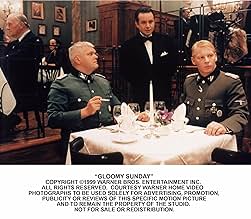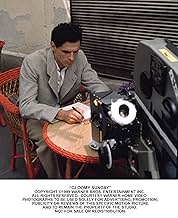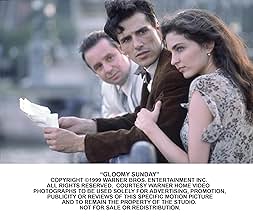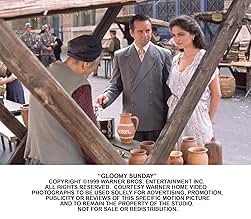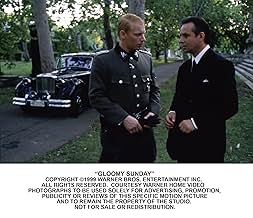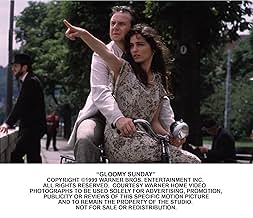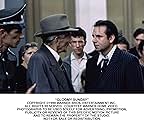IMDb-BEWERTUNG
7,8/10
8700
IHRE BEWERTUNG
Füge eine Handlung in deiner Sprache hinzuFollows three men who are in love with a beautiful waitress during World War II: an intellectual restaurant owner, a mysterious musician, and an erratic businessman.Follows three men who are in love with a beautiful waitress during World War II: an intellectual restaurant owner, a mysterious musician, and an erratic businessman.Follows three men who are in love with a beautiful waitress during World War II: an intellectual restaurant owner, a mysterious musician, and an erratic businessman.
- Regie
- Drehbuch
- Hauptbesetzung
- Auszeichnungen
- 7 Gewinne & 5 Nominierungen insgesamt
Empfohlene Bewertungen
Fact and fiction combine to provide a delightfully entertaining film about a restaurant in Budapest. Clientele flocked there for the good food, the good music and I daresay the beautiful Ilona who served on the tables. What more could one wish for? Unfortunately the good times do come to an end when the Nazis sweep into Hungary and decide forthwith to eliminate the Jewish population.
Strange as it may seem the whole theme of the film revolves around a plaintive tune which first gained popularity in Budapest, later in Europe and then the whole world. The words to the song called "Gloomy Sunday" are full of despair.
The clients who came to the restaurant always asked for this particular melody to be played on the grand piano. It is played many times during the film. It is haunting and addictive. We find ourselves wanting to hear it again and again such is its hypnotic power.
All praise to Erika Marozsan who provides the romantic interest as Ilona in the story. I am told she is a newcomer to the screen, but as an actor she will surely be much sought after in the future. She is beautiful and her close-ups full of feeling. She has lovely hands that caress a lover's face with such gentle charm. She is much admired by Lazlo (Joachim Krol) owner of the restaurant and also by Andras (Stefano Dionisi) newly appointed pianist and composer of "Gloomy Sunday".
All goes well for the threesome until the arrival of a Nazi officer (Ben Becker) who takes a fancy to Ilona despite her constant rebuttals. In their position of power Nazis have the means of disposing of people who stand in their way.
This is a film of contrasts. First we have the beautiful setting which is Budapest, romantic songs and people in love. Then we have the Nazi occupation, loss of freedom and threats of Auschwitz.
This film must be seen to the end. There is an amazing twist of Fate in the last few minutes and it seems to me that at last in some remarkable way justice is seen to be done.
Strange as it may seem the whole theme of the film revolves around a plaintive tune which first gained popularity in Budapest, later in Europe and then the whole world. The words to the song called "Gloomy Sunday" are full of despair.
The clients who came to the restaurant always asked for this particular melody to be played on the grand piano. It is played many times during the film. It is haunting and addictive. We find ourselves wanting to hear it again and again such is its hypnotic power.
All praise to Erika Marozsan who provides the romantic interest as Ilona in the story. I am told she is a newcomer to the screen, but as an actor she will surely be much sought after in the future. She is beautiful and her close-ups full of feeling. She has lovely hands that caress a lover's face with such gentle charm. She is much admired by Lazlo (Joachim Krol) owner of the restaurant and also by Andras (Stefano Dionisi) newly appointed pianist and composer of "Gloomy Sunday".
All goes well for the threesome until the arrival of a Nazi officer (Ben Becker) who takes a fancy to Ilona despite her constant rebuttals. In their position of power Nazis have the means of disposing of people who stand in their way.
This is a film of contrasts. First we have the beautiful setting which is Budapest, romantic songs and people in love. Then we have the Nazi occupation, loss of freedom and threats of Auschwitz.
This film must be seen to the end. There is an amazing twist of Fate in the last few minutes and it seems to me that at last in some remarkable way justice is seen to be done.
This film is about the life of a woman, who got caught between 2 lovers against a backdrop of the turbulent times of the Holocaust.
Words cannot describe how beautiful and powerful this film is. Everything is excellent. The sets are beautiful, and the scenes are beautifully composed. Ilona is great as the lady which every men would fall in love with. She has this graceful elegance which is very magnetic. Laszlo's work as the restaurant owner is convincing, he has every detail of the restaurant under control. The music is great. When I listened to the song "Gloomy Sunday', I felt this chill spreading through my body, as if I was going to be the next victim. Another highlight for me is the uptight secretary who lives by the book, which is clearly a satire about the German culture. The plot is highly touching and powerful, and I do urge everyone to see this beautiful film.
Words cannot describe how beautiful and powerful this film is. Everything is excellent. The sets are beautiful, and the scenes are beautifully composed. Ilona is great as the lady which every men would fall in love with. She has this graceful elegance which is very magnetic. Laszlo's work as the restaurant owner is convincing, he has every detail of the restaurant under control. The music is great. When I listened to the song "Gloomy Sunday', I felt this chill spreading through my body, as if I was going to be the next victim. Another highlight for me is the uptight secretary who lives by the book, which is clearly a satire about the German culture. The plot is highly touching and powerful, and I do urge everyone to see this beautiful film.
...on why this film is doing well in communities unafraid to see subtitled films. For one thing, the beginning and ending create and resolve a compelling mystery (most of the film is a flashback). For another, you may or may not believe that a song could drive people to suicide, but you must admit it is a beautiful, sad and haunting melody. The story held my interest, as did the characters. The other obvious appeal was the opportunity to gaze endlessly at the incredibly lovely and angelic Erika Marozsán. I am female and straight and I could not get enough of looking at her; I could easily believe that she might inspire a piece of music that conveyed its composer's hopeless longing for her. (And he wasn't so hard to look at himself!) The only thing I couldn't figure out about Mr. Simpson's comments was what the film had to do with New Zealand. Now I know: nothing! :-)
According to the Los Angeles Times review of this film, "The song was actually composed in 1935 by Rezsö Seress, with lyrics by László Jávor, and did in fact accompany a number of suicides as Europe grew darker; Billie Holliday recorded a popular American version." So I guess it's not so far-fetched after all! Who knew?
According to the Los Angeles Times review of this film, "The song was actually composed in 1935 by Rezsö Seress, with lyrics by László Jávor, and did in fact accompany a number of suicides as Europe grew darker; Billie Holliday recorded a popular American version." So I guess it's not so far-fetched after all! Who knew?
I did not necessarily expect this to be a real good movie. Stories taking place during the Nazi regime and WW2, especially when made by Germans, sometimes tend to be ultra-politically-correct. But, surprise, surprise. Rolf Schübel's first feature (he did documentaries before) uses backdrop of Nazi-occupied Budapest to deliver a meaningful "menage-a-quatre", wrapped in a free interpretation of creation of famous suicide hymn "Gloomy Sunday". Fine acting all over the place, especially by Krol and Becker (still brave in German moviemaking to show a Nazi not as a complete monster, even if he is, after all, the bad guy), and despite the overall sad story executed surprisingly lighthanded. Drama, a touch of humor, some suspense and even some sex (however, the latter seems to be unnecessary sometimes - it would have worked without or with less). Not to be forgotten: excellent soundtrack album, including several versions of "Gloomy Sunday". Definitely one of the best German movies of 1999.
"Gloomy Sunday (Ein Lied von Liebe und Tod)" is a very mittel-European take on "Jules et Jim."
It has resonance with "The Pianist," but was produced in 1999 and is only being released in the U.S. now. Based on an urban legend grounded in fact it demonstrates how a piece of music can perfectly capture the zeitgeist of its times, so much so that it influences people's lives to end them. The original facts, with a list of recordings, are documented at www.phespirit.info/gloomysunday/ which is how I knew to find Marianne Faithfull's recording in my collection to play as I write this.
A love quadrangle starts off as an open, free-spirited affair between a jovial restaurant owner and his high-spirited, sensual hostess, becomes a complex three-some with a sultry composer, then an uptight tourist gets tangled in their lives. But this is Budapest 1933 - 1945, and the personal becomes the political, as the restauranteur is Jewish, the tourist transforms into an S.S. officer, and the composer's signature melody haunts them and the airwaves throughout a Europe falling like dominoes.
While there are lovely shots of the bridges and narrow streets of Budapest in a warm, lush cinematography, especially as seen on desperate bicycle rides (in dress and high heels no less), much of the movie takes place in the restaurant, so that the passage of time and the resulting changing stresses are marvelously shown by the actors' body language. Some of the coincidences are a bit thick, but the political commentary up to the present is effectively pointed.
The melody only gains in power throughout the film and is much more timeless in capturing the feelings of the time -- and any parallel experiences--than the pop or patriotic music Americans associate with the period. From the untranslated credits, it seemed that the closing version in English is Artie Shaw's, though the lead singer wasn't identified there. In the film, the lyrics are an after-thought to try and capture the music's meaning.
It has resonance with "The Pianist," but was produced in 1999 and is only being released in the U.S. now. Based on an urban legend grounded in fact it demonstrates how a piece of music can perfectly capture the zeitgeist of its times, so much so that it influences people's lives to end them. The original facts, with a list of recordings, are documented at www.phespirit.info/gloomysunday/ which is how I knew to find Marianne Faithfull's recording in my collection to play as I write this.
A love quadrangle starts off as an open, free-spirited affair between a jovial restaurant owner and his high-spirited, sensual hostess, becomes a complex three-some with a sultry composer, then an uptight tourist gets tangled in their lives. But this is Budapest 1933 - 1945, and the personal becomes the political, as the restauranteur is Jewish, the tourist transforms into an S.S. officer, and the composer's signature melody haunts them and the airwaves throughout a Europe falling like dominoes.
While there are lovely shots of the bridges and narrow streets of Budapest in a warm, lush cinematography, especially as seen on desperate bicycle rides (in dress and high heels no less), much of the movie takes place in the restaurant, so that the passage of time and the resulting changing stresses are marvelously shown by the actors' body language. Some of the coincidences are a bit thick, but the political commentary up to the present is effectively pointed.
The melody only gains in power throughout the film and is much more timeless in capturing the feelings of the time -- and any parallel experiences--than the pop or patriotic music Americans associate with the period. From the untranslated credits, it seemed that the closing version in English is Artie Shaw's, though the lead singer wasn't identified there. In the film, the lyrics are an after-thought to try and capture the music's meaning.
Wusstest du schon
- WissenswertesWieck, the Nazi played by Ben Becker, is a fictionalized SS Col. Kurt Becher, who was acquitted in Nuremberg of war crimes and who ended up the richest man in Germany.
- PatzerAt a movie theater, the trio watches a newsreel that declares that the song "Gloomy Sunday" "drove 157 people in Hungary to suicide in the past eight weeks." It's unknown whether that statement ever actually appeared in a German newsreel during the war. There is no evidence that the song ever actually drove more than a handful of people--if any--to suicide.
- VerbindungenFeatured in Die Männer vom K3: Jugendliebe (1999)
- SoundtracksSzomorú Vasárnap/Gloomy Sunday
Music by Rezsö Seress
Lyrics by László Jávor
English lyrics by Sam Lewis (as Sam M. Lewis)
Akla Musikverlag Berlin
Top-Auswahl
Melde dich zum Bewerten an und greife auf die Watchlist für personalisierte Empfehlungen zu.
- How long is Gloomy Sunday?Powered by Alexa
Details
- Erscheinungsdatum
- Herkunftsländer
- Sprachen
- Auch bekannt als
- Ein Lied von Liebe und Tod - Gloomy Sunday
- Drehorte
- Produktionsfirmen
- Weitere beteiligte Unternehmen bei IMDbPro anzeigen
Box Office
- Bruttoertrag in den USA und Kanada
- 585.604 $
- Eröffnungswochenende in den USA und in Kanada
- 7.102 $
- 22. Juni 2003
- Weltweiter Bruttoertrag
- 646.532 $
- Laufzeit1 Stunde 52 Minuten
- Farbe
- Sound-Mix
- Seitenverhältnis
- 1.85 : 1
Zu dieser Seite beitragen
Bearbeitung vorschlagen oder fehlenden Inhalt hinzufügen

Oberste Lücke
What is the Spanish language plot outline for Gloomy Sunday - Ein Lied von Liebe und Tod (1999)?
Antwort

